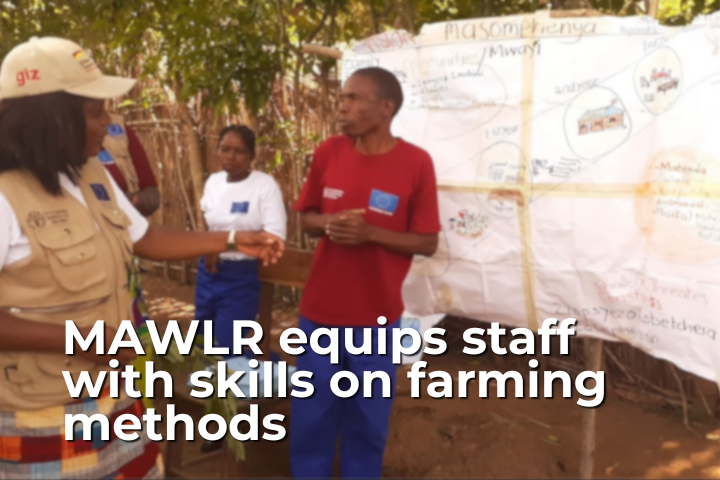MAWLR delegation explores agricultural best practices in Malawi

In a collaborative initiative led by the Food and Agriculture Organization of the United Nations (FAO) country offices in Namibia and Malawi, a delegation comprising 31 agricultural extension staff and management from the Ministry of Agriculture, Water and Land Reform (MAWLR) recently embarked on a study excursion mission to gather insights and draw on best agricultural practices in Malawi, with the overarching aim of equipping MAWLR staff with skills that are crucial to empower Namibian farmers through enhanced extension service delivery coupled with innovative farming methods. The initiative aligns with the ongoing collaboration between FAO and MAWLR on the project titled “Emergency response to mitigate multiple shocks and enhance resilient livelihoods in Namibia,” generously funded by the Government of Japan.
The mission was rooted in various FAO-led interventions, encompassing the Caisse de Resilience (CdR) concept, Farmer Field School (FFS), Conservation Agriculture (CA), and other tailor-made capacity-building trainings. Recognizing the importance of firsthand experiences, MAWLR nominated 31 ministerial staff, including Chief Agricultural Scientific Officers, and trained Agricultural Technicians, along with selected Heads of Directorates, for the enlightening study excursion to Malawi.
Capacity building
Gift Kamupingene, FAO National Project Coordinator, emphasized the significance of this exchange, stating, “This collaborative effort is a testament to FAO’s commitment to building capacity for sustainable agriculture. The shared knowledge will contribute significantly to enhancing agricultural production and productivity in Namibia while fostering resilience and innovation.” In Malawi, the delegation engaged counterparts and farming communities, encompassing vital areas such as visiting FFS sites and groups in rural communities such as Mangochi to enhance the understanding and practical application of the approach. Additionally, they conducted site visits to areas where Malawi’s Sustainable High-Value Enterprise
Project was implemented under the Market-Oriented Smallholder Horticulture Empowerment and Promotion (MaSHEP) framework, thereby creating linkages to augment the N-SHEP program being rolled out in Namibia. The mission also encompassed a one-day session with Agricultural Extension staff in Malawi to exchange ideas on issues and challenges related to extension service delivery. This session delved into exploring new and non-conventional approaches in the evolving digital world, including the Monitoring, Evaluation and Learning (MEL) digital platform in agriculture. Additionally, the mission involved acquiring skills and insights into the practical use of crop yield estimation, conducting food security assessments, utilizing early warning models, and deployment of mobile-based applications by Agricultural Extension staff in Malawi.
An eye-opener
Ben Haraseb, Director of the Directorate of Agricultural Production, Extension and Engineering Services (DAPEES) at MAWLR, conveyed his enthusiasm about the excursion, stating, “We are thrilled with the knowledge we acquired from Malawi. The entire exchange was definitely an eye opener and a valuable learning experience,” said Haraseb. Haraseb added that the knowledge gained by the group will help improve MAWLR’s efforts to enhance agricultural practices in Namibia, especially among rural farmers. “Namibia is at an infant stage in terms of concepts such as Farmer Field Schools, and the knowledge gained by our agricultural extension staff from our counterparts in Malawi, who are more familiar with the concept, will no doubt allow us to improve our services to farmers and bolster our agricultural development centers across the country.”
Meanwhile, Fabian Booys, an MAWLR Agricultural Technician from the Hardap region, had this to say about the study excursion, “The insights gained, particularly in Farmer Field Schools, conservation agriculture, and extension services approaches, are invaluable. Farmer Field Schools, in particular, are a success in Malawi, and I believe that if implemented effectively in Namibia, we stand to address most of the challenges faced by small-scale farmers.”
Knowledge exchange
The choice of Malawi for this mission was intentional, grounded in its role as a pilot country, alongside Namibia, for the FAO/National Aeronautics and Space Administration (NASA) project on satellite-based crop yield estimation which is led by MAWLR’s Early Warning and Food Security Unit. This deliberate selection served to promote cross-fertilization of ideas and deepen the understanding and utilization of mobile-based applications deployed under the FAO/NASA
project. Additionally, the mission included visits to specific farming sites where Conservation Agriculture (CA) has demonstrated positive impacts on production and livelihoods transformation, aligning seamlessly with MAWLR’s Comprehensive Conservation Agriculture Program (CCAP) II for 2024/2025–2028/2029. The excursion follows a comprehensive three-week FFS Training of Trainers (ToTs) organized by FAO in conjunction with MAWLR, held from the 4th to the 22nd of December 2023. The training, hosted in Rundu, saw the participation of 29 Agricultural Extension Staff from all 14 regions of Namibia, and was aimed at equipping participants with essential skills for enhancing agricultural practices at the grassroots level.
-FAO